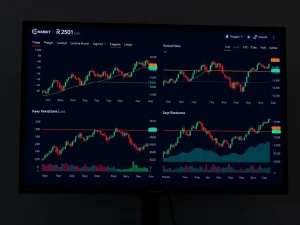Australia Crypto Banking: Urgent Call to End Challenging ‘Friction’ for Users

Australian crypto users frequently encounter significant obstacles when interacting with traditional financial institutions. Despite years of progress in the cryptocurrency sector, a persistent challenge remains: bank ‘friction.’ This ongoing issue hampers seamless engagement with crypto exchanges and businesses. Industry leaders are now advocating for clearer governmental rules. They believe this will enable regulators and banks to differentiate between legitimate and illicit actors, ultimately fostering a healthier ecosystem for Australia crypto banking.
Persistent Banking Barriers for Australian Crypto Users
Australian crypto users continue to face substantial banking hurdles. A recent survey highlights these difficulties. Binance, a leading crypto exchange, surveyed 1,900 Australians. The findings were stark: 58% of respondents desired easy access to deposit funds into exchanges without limits. Furthermore, 22% reported changing banks specifically to simplify their crypto purchases. This data clearly indicates a widespread problem.
Matt Poblocki, general manager of Binance’s Australian and New Zealand operations, emphasizes the impact. He states that consistent access to financial services directly influences market participation, confidence, and trust. Barriers, therefore, slow adoption and limit growth. Poblocki also warns about unintended consequences. He suggests that inconsistent access risks driving activity offshore. Less regulated venues then become attractive. This scenario benefits neither consumers nor the broader financial system.
Regulatory Progress vs. Ongoing Friction in Australia Crypto Banking
Australia has made considerable strides in cryptocurrency regulation. Crypto exchanges, for example, were brought under Anti-Money Laundering (AML) laws in 2018. This required registration with AUSTRAC, Australia’s financial intelligence agency. More recently, the country saw significant product developments. Australia’s first exchange-traded fund (ETF) holding Bitcoin (BTC) directly launched in June 2024. An Ether (ETH) ETF followed in October 2024. Additionally, Coinbase and OKX recently introduced services for self-managed superannuation funds (SMSFs). These initiatives provide new avenues for crypto to integrate into Australia’s retirement savings system. Despite these advancements, Australia crypto banking challenges persist.
Kate Cooper, CEO of OKX Australia, shared her experience. She previously worked in traditional finance at NAB, a major Australian bank. Now, she leads a crypto exchange. Cooper observes that institutions still deny banking services to crypto businesses. They also prevent transfers to crypto exchanges. Commonwealth Bank (CBA), one of Australia’s largest banks, imposed a limit. Customers can send a maximum of 10,000 Australian dollars ($6,527) per month to crypto exchanges. This policy highlights the ongoing friction.
Cooper frequently hears from frustrated customers. They ask, “My bank won’t let me. Which bank will allow this? How do I proceed? What are my options?” She acknowledges the frustration but believes it does not entirely halt adoption. Australia boasts significant adoption rates, exceeding 30%. This indicates Australians actively participate in crypto. However, the existing friction certainly causes considerable customer frustration.
The Pervasive Issue of Debanking Australia Crypto Businesses and Users
The practice of debanking presents a massive problem for the crypto sector in Australia. Debanking involves banks closing accounts or refusing services. They target individuals and organizations flagged as potential risks. A prominent historical example is Operation Chokepoint in the United States. Jonathon Miller, Kraken’s General Manager for Australia, confirms this trend. He reports that Kraken has seen countless clients and employees lose access to their accounts. This happens simply for engaging with the crypto ecosystem. This systemic issue severely impacts Australian crypto users and businesses alike.
Miller explains the consequences for crypto businesses. These roadblocks create concentration risks. Local exchanges and startups often find only a very limited set of banks willing to work with them. He views this as a fundamental flaw in the financial system. If an intermediary can unilaterally cut off basic financial services, especially when individuals seek financial independence, the system itself appears broken. This perspective underscores the urgent need for a resolution to debanking Australia crypto entities.
Binance Australia has also encountered significant roadblocks. While users can buy and sell crypto using credit or debit cards, direct Australian dollar deposits or withdrawals via bank transfer are often unavailable. Matt Poblocki attributes this to a broader industry challenge, not an isolated issue. Binance maintains alternative on-ramps and off-ramps. The exchange also actively works towards more sustainable solutions. Cooper also confirms debanking remains a massive issue. Banks refuse services to businesses operating legitimately within the crypto sector.
Advocating for Clear Crypto Regulation Australia
Industry leaders agree on the most critical solution: fit-for-purpose legislation. Kate Cooper believes such legislation would significantly reduce crypto roadblocks. She anticipates draft legislation might be released soon. This new framework, she argues, will help distinguish legitimate actors from bad ones. It will provide banks with clearer indications. They can then identify who operates within the regulated financial services industry. This clarity is vital for fostering trust and integration in Australia crypto banking.
Australia’s government, led by the center-left Labor Party, proposed a new crypto framework earlier this year. This framework aims to regulate exchanges and address debanking. The Australian Treasury outlined four key priorities for its new crypto regulations in March. These priorities highlight the government’s commitment to a structured approach. Clear legislation and regulatory guidance are essential, according to Jonathon Miller. He also calls for an end to blanket restrictions on the crypto industry. Some institutions have begun to adopt a more nuanced approach. However, this is not yet universally accepted across the board. Miller emphasizes the need for a sophisticated due diligence process. This process must differentiate between malicious actors and legitimate businesses building responsibly.
Matt Poblocki echoes these sentiments. He stresses the need for legislation. He also calls for collaboration among government, banks, and the industry. This collaborative effort will provide much-needed regulatory clarity. Clear guidance, coupled with stakeholder cooperation, offers the best path to resolve debanking issues. The goal is to create an environment where Australian crypto users can participate confidently and securely. This requires robust and adaptable crypto regulation Australia.
The Future of Australia Crypto Banking: Collaboration and Clarity
The path forward for Australia crypto banking necessitates a multi-faceted approach. While significant regulatory milestones have been achieved, the practical challenges faced by Australian crypto users and businesses persist. The experiences of platforms like Binance Australia, OKX, and Kraken highlight the urgent need for systemic change. These challenges range from restrictive deposit limits to outright debanking. Such friction not only frustrates users but also risks pushing valuable economic activity into less transparent channels.
The industry’s collective voice is clear: comprehensive and tailored crypto regulation Australia is the silver bullet. Such legislation would empower banks with the necessary tools and confidence to engage with the crypto sector. It would create a level playing field, ensuring that compliant businesses can operate without arbitrary barriers. This proactive regulatory stance would protect consumers while fostering innovation. It would also solidify Australia’s position as a forward-thinking financial hub.
Ultimately, resolving the ongoing ‘friction’ requires sustained dialogue and genuine collaboration. Government bodies, traditional financial institutions, and cryptocurrency companies must work together. They need to build a framework that supports both financial stability and technological advancement. Only then can Australia fully unlock the potential of the digital asset economy for all its citizens. This collaborative effort will ensure a robust, secure, and accessible future for all Australian crypto users.









